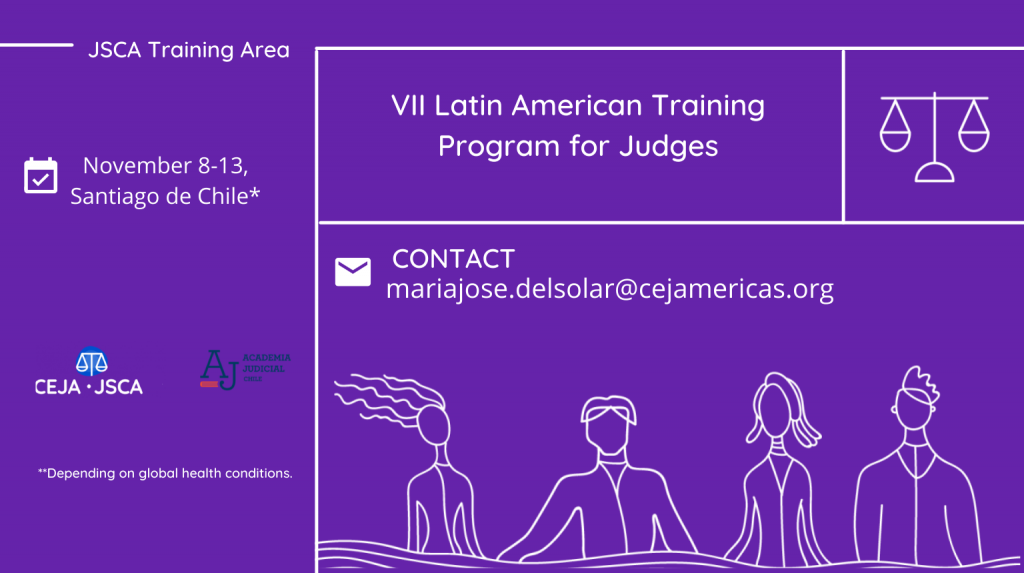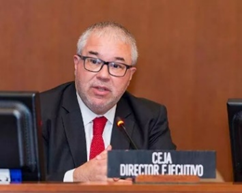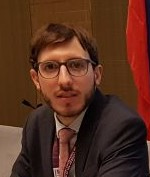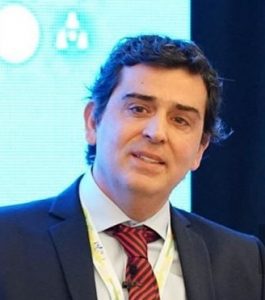
VII Latin American Training Program for Judges
- Introduction
- Description
- Objectives
- Contents
- Admission and Application
- Cost
- Instructors
- Participants and Duration
- Contact
- Registration Form
Judges must play a “teaching” role in the process of moving towards an oral hearings system. Hearing management is a space that allows standards to be developed for the work of litigators which, in addition to allowing for full exercise of rights in terms of adversarial proceedings, prevents poor practices among attorneys who seek to delay the process.
In this context, judges’ role in managing both civil and criminal hearings will be observed with a great deal of interest by litigators who hope that they will set a “higher standard,” establishing uniform criteria for resolving the situations that develop during a hearing.
In response to this, and based on the experience that it has developed, JSCA has designed a training program for Latin American judges. The goal of this workshop-based course is to set a series of criteria and develop skills that allow judges to manage hearings successfully and establish guidelines for the various hearings that are held during oral proceedings.
This intensive five-day course is geared towards Latin American criminal court judges. Participants will develop theoretical, analytical, and practical skills that will allow them to better manage hearings.
Over the course of one week, participants will engage in mock hearings, visit justice institutions, and observe hearings in Chile’s criminal courts. They also will attend theoretical classes that address Latin American criminal procedure law and its reforms from a comparative perspective focused on the experience of operators and experienced international instructors who have participated in judicial reform processes in the region over the past 20 years.
The course will include the following methodological stages:
- Litigation techniques: Instructors will address the work that attorneys must engage in and will analyze it from the perspective of the judge.
- Development of hearing management techniques: Participants will complete various exercises focused on teaching them to effectively manage hearings. The exercises will be based on examples presented by the instructors.
- Mock hearings: Participants will apply the techniques that they have learned in mock hearings.
- Critical analysis and feedback: Participants will offer oral presentations that will be evaluated by their peers and the course facilitators.
General Objective
By the end of the course, participants will have increased their abilities and developed skills that allow them to identify disputed positions in the hearing, manage it based on those positions, and assess the information produced in order to reach a decision.
Specific Objectives
Participants will acquire the following skills through this course:
- Identify the theory of the case in each part of the trial, differentiating between the theory of the facts, legal theory, and evidentiary theory with a special emphasis on disputed facts.
- Determine relevance at trial based on the analysis of the opening arguments. Prevent the parties from engaging in actions meant to delay the proceedings.
- Moderate the examination and cross-examination of witnesses based on the foundations and logic of each tool used to produce information.
- Address objections while respecting the oral trial dynamic.
- Develop a sentence based on the analysis of the evidence produced at trial.
- Module 1: A new role for judges in the adversarial system
- Module 2: Case theory and recognition of facts in dispute
- Module 3: Guarantee of fact and the role of the judge in hearings on agreements
- Module 4: Developing awareness about incorporating gender and sexual orientation into the work of judges in criminal cases
- Module 5: The role of the judge in adversarial hearings
- Module 6: The role of the judge in the intermediate hearing
- Module 7: The role of the judge in determining expert evidence admissibility
- Module 8. Discussion of the hearings observed and exchanges with judges
- Module 9: The role of the judge at trial: A practical workshop
REGISTRATION
Registration will be open through October 15, 2021.
Applicants must complete the registration form. Once the form has been received, the applicant will receive an email with instructions for paying for the course.
Payment must be received by October 29, 2021.
This program costs US$ 1000.
Once you receive your acceptance letter via email, you will need to pay a $100 deposit, which will be applied to the full tuition cost. You can make this payment using the WebPay system and a credit card.
The remaining amount may be paid in 4 installments using the WebPay system and a credit card.
Discounts
Group discounts are available for institutions:
- 9 or more people: 30%
- 4 to 8 people: 20%
- 3 people: 10%
 Jaime Arellano attorney (1991) who holds an undergraduate degree in Legal Sciences from the Pontificia Universidad Católica de Chile Law School (1989) as well as a Master’s degree in Public Administration and Public Policy (MPA) from American University School of Public Affairs (1996) and a Master’s in Law (LL.M.) in Litigation and Non-adversarial Methods from the Universidad Interamericana de Puerto Rico Law School (2019). He has held Fulbright and Chilean Presidential scholarships.
Mr. Arellano has been a faculty member at Universidad de Santiago and the Chilean Judicial Academy and has offered courses in the Universidad de Chile and Universidad Católica de Chile Law Schools and at American University Washington College of Law. Has been the Executive Director of the Justice Studies Center of the Americas (JSCA) since January 2014.
Jaime Arellano attorney (1991) who holds an undergraduate degree in Legal Sciences from the Pontificia Universidad Católica de Chile Law School (1989) as well as a Master’s degree in Public Administration and Public Policy (MPA) from American University School of Public Affairs (1996) and a Master’s in Law (LL.M.) in Litigation and Non-adversarial Methods from the Universidad Interamericana de Puerto Rico Law School (2019). He has held Fulbright and Chilean Presidential scholarships.
Mr. Arellano has been a faculty member at Universidad de Santiago and the Chilean Judicial Academy and has offered courses in the Universidad de Chile and Universidad Católica de Chile Law Schools and at American University Washington College of Law. Has been the Executive Director of the Justice Studies Center of the Americas (JSCA) since January 2014.
 Leonel GonzálezArgentine attorney specializing in Criminal Law with a degree from the Universidad de Buenos Aires Law School. He completed the Latin American Certificate Program on Criminal Procedure Reform at Universidad Diego Portales Law School (Chile) and is currently pursuing a master’s degree in Criminal Law and Criminal Procedure from Osgoode Hall Law School at York University (Canada). He served as a consultant on the Evaluation of the Implementation of Panama’s Adversarial Criminal Justice System; the Evaluation of the Impact of the Fiscal Management Model of Guatemala’s Public Prosecutor’s Office; the project “Evaluation of Chile’s Criminal Procedure Reform Ten Years After Its National Implementation”; on the project Technical Assistance for the Implementation of Uruguay’s Criminal Procedure Code; and on the project “Pretrial Detention in Bolivia.” He has participated as a presenter or instructor in seminars, courses and conferences in the US, Canada, Austria, the Philippines, Mexico, Puerto Rico, Costa Rica, Nicaragua, Colombia, Guatemala, Panama, Peru, Paraguay, Brazil, Bolivia, Chile, Uruguay and Argentina. He is the Regional Vice President for South America of the International Organization for Judicial Training (IOJT) for 2017-2019 and member of the Argentina Procedure Law Association. He has worked in the Federal Criminal Cassation Chamber in the Argentine National Judicial Branch and at the Institute for Comparative Studies in the Criminal and Social Sciences (INECIP).
Leonel GonzálezArgentine attorney specializing in Criminal Law with a degree from the Universidad de Buenos Aires Law School. He completed the Latin American Certificate Program on Criminal Procedure Reform at Universidad Diego Portales Law School (Chile) and is currently pursuing a master’s degree in Criminal Law and Criminal Procedure from Osgoode Hall Law School at York University (Canada). He served as a consultant on the Evaluation of the Implementation of Panama’s Adversarial Criminal Justice System; the Evaluation of the Impact of the Fiscal Management Model of Guatemala’s Public Prosecutor’s Office; the project “Evaluation of Chile’s Criminal Procedure Reform Ten Years After Its National Implementation”; on the project Technical Assistance for the Implementation of Uruguay’s Criminal Procedure Code; and on the project “Pretrial Detention in Bolivia.” He has participated as a presenter or instructor in seminars, courses and conferences in the US, Canada, Austria, the Philippines, Mexico, Puerto Rico, Costa Rica, Nicaragua, Colombia, Guatemala, Panama, Peru, Paraguay, Brazil, Bolivia, Chile, Uruguay and Argentina. He is the Regional Vice President for South America of the International Organization for Judicial Training (IOJT) for 2017-2019 and member of the Argentina Procedure Law Association. He has worked in the Federal Criminal Cassation Chamber in the Argentine National Judicial Branch and at the Institute for Comparative Studies in the Criminal and Social Sciences (INECIP).
 Verónica Sepúlveda BrionesHolds an undergraduate degree in the Legal Sciences and a law degree from Pontificia Universidad Católica de Chile. She has been a tutor for guarantee court internships at the Chilean Judicial Academy since 2006. Sepúlveda also taught various training courses for first-level officials at the same institution from 2005 to 2016. In addition, she offered a course for attorneys on professional skills, knowledge, and abilities in 2011 in Ecuador. She served as an instructor for the Strategic Oral Litigation Course held in Salta, Argentina in November 2018 organized by JSCA. Sepúlveda’s publications include the articles “Identificación de imputados. Condiciones de legitimidad” in Revista de Razonamiento Penal 2/2012 and “Prueba de contexto ¿es posible el control del prejuicio a través de la exclusión probatoria?” in Revista de Razonamiento Penal 2/2012. She currently serves as Lead Judge in the 13th Guarantee Court of Santiago.
Verónica Sepúlveda BrionesHolds an undergraduate degree in the Legal Sciences and a law degree from Pontificia Universidad Católica de Chile. She has been a tutor for guarantee court internships at the Chilean Judicial Academy since 2006. Sepúlveda also taught various training courses for first-level officials at the same institution from 2005 to 2016. In addition, she offered a course for attorneys on professional skills, knowledge, and abilities in 2011 in Ecuador. She served as an instructor for the Strategic Oral Litigation Course held in Salta, Argentina in November 2018 organized by JSCA. Sepúlveda’s publications include the articles “Identificación de imputados. Condiciones de legitimidad” in Revista de Razonamiento Penal 2/2012 and “Prueba de contexto ¿es posible el control del prejuicio a través de la exclusión probatoria?” in Revista de Razonamiento Penal 2/2012. She currently serves as Lead Judge in the 13th Guarantee Court of Santiago. Gonzalo RuaArgentinian. Lawyer. Specialist in Criminal Law from the University of Palermo. Criminal Judge in the City of Buenos Aires from 2003 to date. He was a member of the Judicial Training Center of the Judicial Branch of the CABA, by direct vote of his peers, as Academic Counselor by the judges' estate (2008-2012).
Member of the Board of Directors of INECIP. In this Institution he is Director of the Criminal Systems Reform Program since 2009. He participated in the INECIP, as Coordinator and Advisor in the implementation of the criminal procedure reform in the Provinces of Entre Ríos (2009/2013), Salta (2011) ), Tucumán (2012/2013) Santiago del Estero (2010/2013) and Río Negro (2012/2016).
Gonzalo RuaArgentinian. Lawyer. Specialist in Criminal Law from the University of Palermo. Criminal Judge in the City of Buenos Aires from 2003 to date. He was a member of the Judicial Training Center of the Judicial Branch of the CABA, by direct vote of his peers, as Academic Counselor by the judges' estate (2008-2012).
Member of the Board of Directors of INECIP. In this Institution he is Director of the Criminal Systems Reform Program since 2009. He participated in the INECIP, as Coordinator and Advisor in the implementation of the criminal procedure reform in the Provinces of Entre Ríos (2009/2013), Salta (2011) ), Tucumán (2012/2013) Santiago del Estero (2010/2013) and Río Negro (2012/2016). He has participated as a consultant and / or trainer in several Latin American countries. In Nuevo León, Mexico, he is the coordinator of the Training Agreement with the Judicial Power of that state and with the Autonomous University of Nuevo Leon. Professor of undergraduate and postgraduate studies at the Faculty of Law of the University of Buenos Aires, since 1996. Professor of Postgraduate Specialization in Magistracy at the National University of La Matanza (2015). He was a tenured professor at the University of Palermo (2003-2006) and in several Foreign Universities (Masters in the National University of Pilar, Paraguay, 2008, San Carlos University of Guatemala, 2009, among others). He participated as a consultant and advisor in drafting organic laws and reforms to the Code of Criminal Procedure in the City of Buenos Aires and the Provinces of Catamarca, Santiago del Estero, Neuquén, Entre Rios and Río Negro. Former scholar of the Judicial Studies Center of the Americas (JSCA) in the "Training of Trainers for Criminal Procedure Reform" Program (2007) and in the Program "Challenges and opportunities in the Assessment of evidence in accusatory oral trials ( 2010). Trainer for the CEJA in Lima, Peru (2011), Panama (2014), Sao Paulo, Brazil (2015), Chile (2015), Nicaragua (2016) and in the course "Program for the Implementation of the Criminal Procedure Reform in Argentina" (2012 to date). Teacher by the JSCA in the Training Program for judges, skills in conducting hearings (2015/2016). International consultant in the implementation of the Ecuadorian criminal system (USAID, 2011/2012), and in the evaluation of the implementation of the System Criminal Accusatory in Panama (UNODC, 2014/2015) and in the evaluation of the Criminal Procedure Reform in Chile (JSCA, 2016). General Coordinator and head teacher of the Annual Program of Graduate Update in Criminal Litigation in the UBA -anual- (2014 to date).
He is currently Director of the Training Program for the Criminal Procedure Reform in Argentina and the Judicial Systems magazine. Co-director, together with Dr. Alberto Binder, from the collection "Fundamental concepts of the accusatory system", Nuevo León, Mexico. Co-author of the book "Code contravencional commented of the CABA" (2010). Author of the books "Counter-examination of Witnesses" and "Direct Examination of Witnesses".
This program is designed for criminal court judges from Latin America.
Duration: 34 horas
For more information, contact María José del Solar at mariajose.delsolar@cejamericas.org.